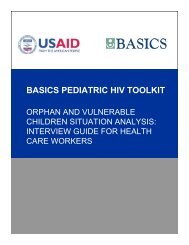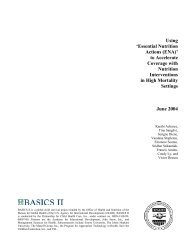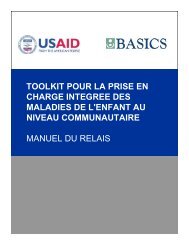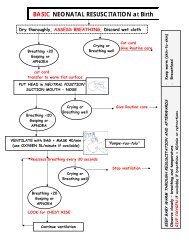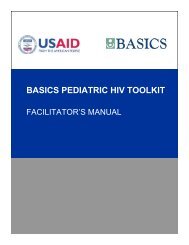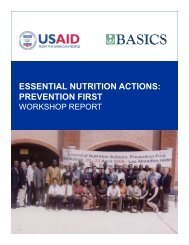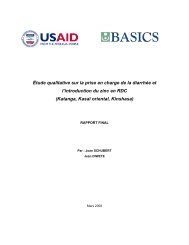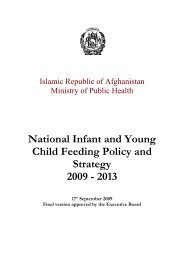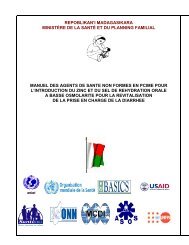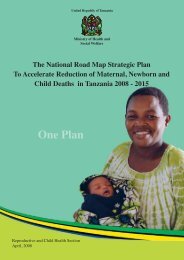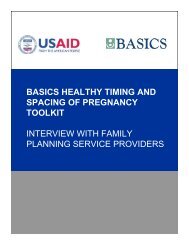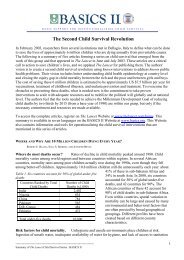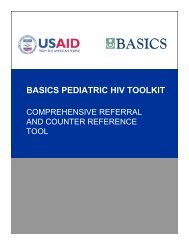Integrated Maternal and Newborn Care Basic Skills Course ...
Integrated Maternal and Newborn Care Basic Skills Course ...
Integrated Maternal and Newborn Care Basic Skills Course ...
Create successful ePaper yourself
Turn your PDF publications into a flip-book with our unique Google optimized e-Paper software.
• maternal infections, including urinary tract infection during the last months of pregnancy<br />
• premature rupture of the membranes (>18 hours)<br />
• unhygienic delivery practices, including poor cord care<br />
These risk factors are significant <strong>and</strong> have important practical implications:<br />
• Babies with these maternal risk factors may appear normal at birth.<br />
• The signs may appear after the baby has returned home.<br />
• Identification of the maternal risk factors can lead to prophylactic antibiotic treatment that<br />
may be life saving.<br />
• These babies need careful follow-up <strong>and</strong> should benefit from a longer stay at the health<br />
center.<br />
• Even in the absence of laboratory tests in peripheral health centers, just taking a good<br />
maternal history may help identify these risk factors <strong>and</strong> enable suitable actions.<br />
Late-onset infections (day 4-28) are usually acquired from the environment in the home or<br />
facility. They are caused by several factors including:<br />
• Unhygienic use of formulas, other milk, <strong>and</strong> fluids instead of exclusive breastfeeding.<br />
• Poor newborn care practices, such as lack of proper h<strong>and</strong> washing, contact with unclean<br />
clothes <strong>and</strong> other items, infected persons, use of improperly cleaned/sterilized<br />
supplies/equipment (the last mentioned is particularly common at the facility level).<br />
• Excessive, invasive hospital procedures with poor infection control practices.<br />
TYPES OF NEONATAL INFECTION<br />
Major Infections<br />
Specific entities such as pneumonia, diarrhea, septicemia, <strong>and</strong> meningitis are difficult to<br />
diagnose in the newborn, as the signs may be nonspecific <strong>and</strong> the disease spreads rapidly to<br />
involve several organs. Hence, the catch-all term “neonatal sepsis” is used in the public health<br />
area.<br />
Relevant to diarrheas in the newborn period, babies receiving breast milk pass loose stools<br />
with separate watery <strong>and</strong> “curdy” portions several times a day, being particularly frequent in<br />
days 3-5. These are termed “transitional stools” <strong>and</strong> may be wrongly diagnosed as diarrhea,<br />
<strong>and</strong> oral rehydration solution/therapy may be given. The latter is not only needless, but it may<br />
also carry a risk of causing real infection if given in an unhygienic manner.<br />
The risk of diarrheas <strong>and</strong> other major infections is particularly high if initiation of breastfeeding is<br />
delayed <strong>and</strong> the newborn <strong>and</strong> the infant under six months receive other milks <strong>and</strong> fluids. Thus,<br />
even when the mother is HIV-positive <strong>and</strong> opts to give formula feeds, the health workers should<br />
counsel <strong>and</strong> support the family adequately to ensure that the feeds are given in a clean manner.<br />
Otherwise there is a real risk of the baby developing diarrhea with spread of infection that can<br />
result in complications <strong>and</strong> even death. Where appropriate care is not taken, especially in<br />
illiterate, low socio-economic groups, there will actually be a greater chance of babies dying of<br />
such infections than from HIV/AIDS.<br />
150<br />
<strong>Integrated</strong> maternal <strong>and</strong> newborn care<br />
<strong>Basic</strong> skills course



